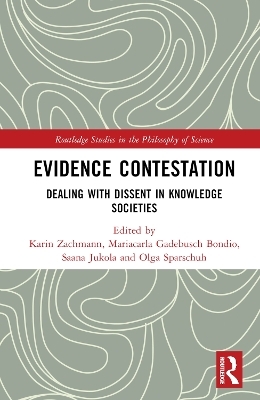
Evidence Contestation
Routledge (Verlag)
978-1-032-21910-3 (ISBN)
Evidence is an essential resource for establishing claims of validity, resolving conflicts, and legitimizing decisions. In recent times, however, evidence is being contested with increasing frequency. Such contestations vary in form and severity – from questioning the interpretation of data or the methodological soundness of studies to accusations of evidence fabrication. The contributors to this volume explore which actors, for what reasons and to what effect, question evidence in fields such as the biological, environmental and health sciences. In addition to actors inside academia, they examine the roles of various other players, including citizen scientists, counter-experts, journalists, patients, consumers and activists. The contributors tackle questions of how disagreements are framed and how they are used to promote vested interests. By drawing on methodological and theoretical approaches from a wide range of fields, this book provides a much-needed perspective on how evidence criticism influences the development and state of knowledge societies and their political condition.
Evidence Contestation will appeal to scholars and advanced students working in philosophy of science, epistemology, bioethics, science and technology studies, the history of science and technology and science communication.
Karin Zachmann is a professor of the history of technology at the Technical University of Munich, Germany, and co-speaker of the DFG research group "Practicing Evidence – Evidencing Practice". Mariacarla Gadebusch Bondio heads the Institute for the Medical Humanities at the University Hospital of Bonn, Germany. She is the co-editor, with Francesco Spöring and John-Stewart Gordon, of Medical Ethics, Prediction, and Prognosis: Interdisciplinary Perspectives (New York: Routledge, 2017). Saana Jukola is a postdoctoral researcher at the Department of Philosophy I, Ruhr University Bochum, Germany, under the DFG-Emmy Noether Research Group "The Return of the Organism in the Biosciences: Theoretical, Historical, and Social Dimensions". Olga Sparschuh is a postdoctoral researcher in history of technology at the Technical University of Munich, Germany, and the coordinator of the DFG research group "Practicing Evidence – Evidencing Practice".
Part 1: Theoretical Framing: Evidence Critique and Contestation 1. What is Scientific Criticism for? Some Philosophical Reflections on Criticism and Evidence within the Scientific Ethos Elif Özmen and Daniel Füger 2. Questioning Evidence: Three Modes of Contestation Eva Barlösius and Eva Ruffing Part 2: Striving for Diverse Evidence: Ecological and Biological Evidence Critique 3. How Many Plots Can the Data Hold? Reconciling Stories and Evidence in Evolutionary Biology Martha Kenney 4. Rethinking Evidence Practices for Environmental Decision-Making in the Anthropocene. What Can We Learn from Invasive Species Research and Policy? Christoph Kueffer Part 3: Questioning the Criteria for Evidence: Health Sciences 5. Surgical Caps and Trouble with Evidence. Epistemology and Ethics of Perioperative Hygiene Measures Saana Jukola and Mariacarla Gadebusch Bondio 6. Negotiating Consensus for Diverging Evidence. An Application of the Explanatory Approach to Guidelines for the Treatment of Substance Use Disorders and Addiction Fredrik Andersen, Yngve Herikstad, Anders Dechsling and Stefan Sütterlin Part 4: Challenging Academic Evidence: Counter Science, Citizen Science and Environmental Activism 7. Evidence against the “Nuclear State”. Contesting Technoscience through Gegenwissenschaft in the 1970s and 1980s Stefan Esselborn and Karin Zachmann 8. Appropriating Evidence. Scientific Criticism and Environmental Activism in the Global Pesticide Controversy during the 1970s and 1980s Sarah Ehlers 9. Participation as Evidence Contestation. The Ambiguous Balance of Social and Epistemic Involvement through Citizen Science Kevin Altmann and Andreas Wenninger Part 5: Interpreting and Communicating Academic Evidence: Consumer Behavior and the Media 10. Exploring Consumers’ Interpretation of Contested Nutritional Evidence. The Relevance of the Moral Foundations Theory Edoardo Maria Pelli and Jutta Roosen 11. Stories about Villains, Mad Scientists and Failure. Patterns of Evidence Criticism in Media Coverage of Genomic Research Susanne Kinnebrock and Helena Bilandzic
| Erscheinungsdatum | 15.02.2023 |
|---|---|
| Reihe/Serie | Routledge Studies in the Philosophy of Science |
| Zusatzinfo | 2 Tables, black and white; 5 Line drawings, black and white; 5 Halftones, black and white; 10 Illustrations, black and white |
| Verlagsort | London |
| Sprache | englisch |
| Maße | 152 x 229 mm |
| Gewicht | 798 g |
| Themenwelt | Geisteswissenschaften ► Geschichte |
| Geisteswissenschaften ► Philosophie ► Erkenntnistheorie / Wissenschaftstheorie | |
| Naturwissenschaften | |
| Sozialwissenschaften ► Politik / Verwaltung | |
| ISBN-10 | 1-032-21910-6 / 1032219106 |
| ISBN-13 | 978-1-032-21910-3 / 9781032219103 |
| Zustand | Neuware |
| Haben Sie eine Frage zum Produkt? |
aus dem Bereich


![Was heißt Denken?. Vorlesung Wintersemester 1951/52. [Was bedeutet das alles?] - Martin Heidegger](/media/113619842)